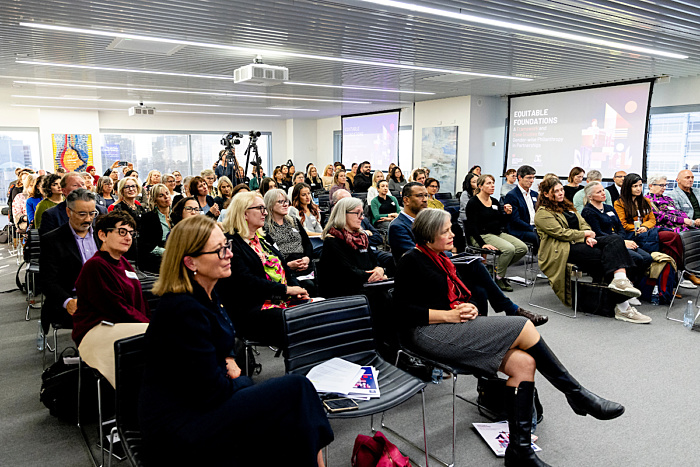
What not-for-profit leaders need to know in 2026
Posted on 12 Feb 2026
Our special NFP trends report distils the views of more than two dozen experts.
Posted on 30 Apr 2024
By Matthew Schulz, journalist

As Australians take to the streets to demand more action to prevent violence against women, and a myriad of studies show the rate of homelessness for women is rocketing, a who’s who of Australian philanthropy welcomed a ground-breaking study into the power of a "gender lens" to drive change.

The Melbourne Social Equity Institute and Australians Investing in Women last week released twin publications, funded by the Paul Ramsay Foundation, that use a “gender lens” to analyse how philanthropy can address some of the nation’s most pressing social issues.
The publications are:
The framework lays out the method for applying a gender lens to partnerships and includes easy-to-follow guidelines taking organisations from the point of collaboration to post-project evaluation. The framework is aimed at helping any philanthropic organisation.
The case studies explore how that framework can be applied to examples of housing involving philanthropic partnerships aimed at women and gender minority groups. They include Viv’s Place, an apartment building for 60 families in Melbourne’s southeast, and the My Home project, which comprises a group of 18 small pre-fab homes for women over 55 in Fremantle in WA.

Australian Investing In Women (AIIW) chief executive Julie Reilly said that the project had the potential to improve the lot of all Australians.
“A gender lens can be used as a tool to hear from and empower people experiencing inequity and improves outcomes for everyone, not just women,” she said.
"Small but significant changes that bring women and girls into focus can maximise the impact of philanthropic investments in community and help create a fairer future.”
A high-powered panel comprising Melbourne Lord Mayor Sally Capp, AIIW board member and CSIRO chief Doug Hilton, the Paul Ramsay Foundation’s chief of alliances, Liz Yeo, and Melbourne Social Equity Institute director Jo Barraket engaged in a robust debate on the significance of the new resource before an audience of scores of the nation’s top philanthropists.

Asked why such a resource was necessary, Professor Jo Barraket told the audience, “the case has been made, but justice hasn’t been achieved,” citing the 13% gender pay gap and the fact that women-led households experience poverty at twice the rate of men-led households as just two examples that came to mind.
She said a gender lens was a powerful tool for philanthropists and their partners.
"The lenses through which we view the world affect what we prioritise, who we see and what levers we pull to create positive change. Increasingly, such change relies on partnerships and collaboration to bring the best combination of resources, experience and will to solving wicked problems."

The Lord Mayor told the audience she had witnessed startling growth in homelessness among women in Melbourne, and while she was excited by the promise of the report, change would not be easy.
“One of the biggest barriers is that we’re not willing to have what are often uncomfortable … and sometimes ferocious discussions to challenge the status quo,” Ms Capp said.
“I believe that this research is going to help us by forming the right sorts of alliances, by measuring and giving guidance on how we can work better together.”

Ms Yeo drew on a past role with Shelter NSW to cite the example of an attempted open day for homeless people that attracted largely men from rooming houses, mostly because hoped-for female clients did not feel safe to turn up to an event dominated by men.
Dr Hilton drew parallels with the nation’s scientific endeavours, noting “there are no meaningful problems nationally that we can work on alone”.
He said Australians were increasingly discussing and valuing intersectionality and diversity in their organisations. “Applying a gender lens isn’t just about equality, it’s about better outcomes for everyone.”

Posted on 12 Feb 2026
Our special NFP trends report distils the views of more than two dozen experts.

Posted on 11 Feb 2026
The ballooning cost-of-living crisis is affecting Australian families to the extent that many…

Posted on 11 Feb 2026
Rev. Salesi Faupula is the Uniting Church’s moderator for the synod of Victoria and Tasmania. Born…

Posted on 11 Feb 2026
Service providers have expressed cautious support for the federal government’s Thriving Kids…

Posted on 11 Feb 2026
Australia’s not-for-profits need strategic investment by the federal government to support the…

Posted on 11 Feb 2026
For the first time, charities commissioner Sue Woodward has confirmed the Australian Charities and…

Posted on 11 Feb 2026
Opinions polls insist Pauline Hanson's fortunes are on the rise, but it is likely that enthusiasm…

Posted on 10 Feb 2026
As my family dropped our teenage son off at the airport in the first week of January to embark on a…

Posted on 04 Feb 2026
Last week’s announcement that women made up only one-third of recipients in the Australia Day…

Posted on 04 Feb 2026
As we move into 2026, I can’t help but think the world is wobbling a little.

Posted on 04 Feb 2026
An academic studying the phenomenon of “headline fatigue” – where news consumers tune out of…

Posted on 04 Feb 2026
In this time of escalating climate impact, the head of Australian Ethical Foundation, Kate…